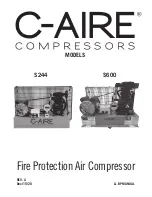
25
Series P100 Pressure
Control
The P100 series, manufactured by Johnson Control, Inc., are
encapsulated, non adjustable, single-pole single throw, direct
mount pressure controls typically used for low or high
pressure cutouts. On the Heatcraft manufactured parallel
systems, the control is used for High Pressure cutout.
There are two types available. Auto Reset Models and
Manual Reset Models.
Figure 13.
Auto Reset Models
When pressurized to the selected actuation pressure setting,
the internal snap-acting disc reverses its shape and drives a
set of electrical contacts either open or closed. When the
pressure drops below the de-actuation pressure setting, the
disc snaps back to its preset position thus resetting the
electrical contacts.
Manual Reset Models
The snap-acting disc in the manual reset model opens the
electrical contacts when actuated by the pressure sensor.
Once the disc snaps, the contacts are held open until an
external force on the push button closes them. Because of
the disc’s link with the pressure sensor, the contacts cannot
be reset until the pressure drops to a predetermined level.
The latching mechanism inside the manual reset model is trip
free. The electrical contacts will cutout even if the reset
button is held fully depressed. The control can only be reset
when the pressure returns to a predetermined level.
Liquid Level Switch
S-9400 Level Switch Series
OPTION – Not available on all systems or receivers.
Figure 14.
Table19. Level Switch Table
CAT
VOLTAGE
RESISTIVE
CONTACTS
NO.
RATING
LIQ. PRESENT
S-9420
208/240
50/60 Hz
.5 Amp
N.C.
CAT
REPLACEMENT
REPLACEMENT
NO.
WIRE COLOR
MODULE NO. SIGHT GLASS
CODE
NO.
S-9420
RED & WHITE
2-044-015
3-020-063
Operation
The S-9400 Series Level Switches manufactured by
A C & R
C
OMPONENTS
uses light reflecting from a conical glass prism as
a means of detecting the absence of a fluid at the level of the
glass cone. When no fluid covers the lower half of the cone,
infra-red light from the module reflects from the mirror-like
inner surface of the cone back to a light detector signaling the
electronic module to switch. When fluid covers the lower half
of the glass cone, the light from the module passes into the
fluid. This absence of light is detected by the module which
switches into the opposite direction. The module provides a
.06/.10 differential distance from the cone point down.












































